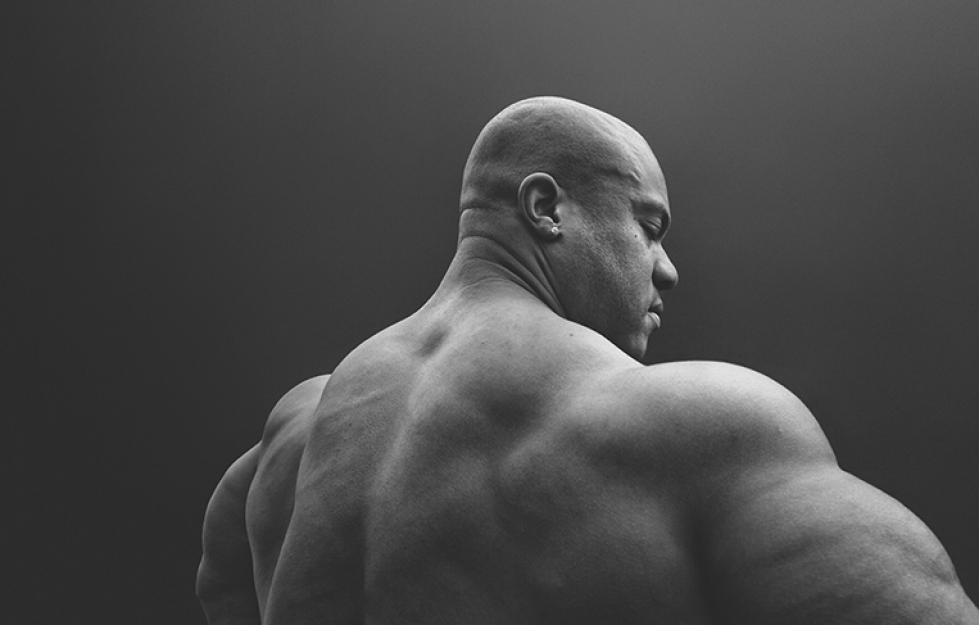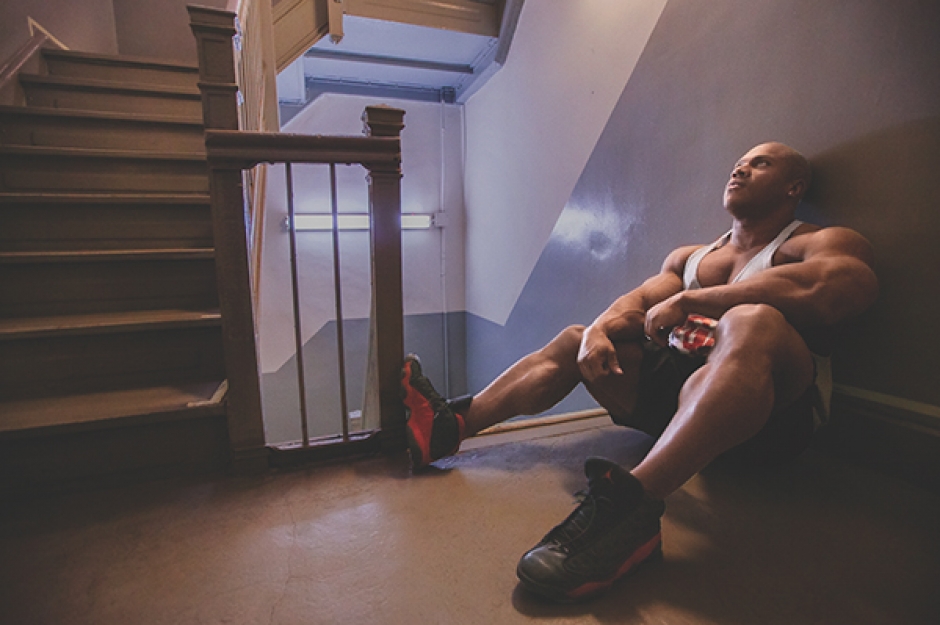In the world of professional bodybuilding, there is only room for one at the top. That is why Mr. Olympia is the most elite club in professional sports. Over the last half-century, since the first Mr. Olympia competition in 1965, only 13 men have held the coveted trophy in their hands—the same trophy that Arnold Schwarzenegger in Pumping Iron. As the reigning four-time Mr. Olympia, Phil Heath knows that there is a bull’s eye painted across the most muscular back in the business.
“I know there are people who would like to see another person win,” Heath says. “I get it. People root for their guy, and it’s good for the sport. But when it comes to judging, it’s not about personal favorites. The judges can’t say, ‘Don’t give it to Phil; he’s won so many already.’ It goes to the person who deserves it. I don’t get upset about it. The love and the hate, they grow together. Everyone is telling you what you can’t do or won’t do. But these people don’t know what I can or can’t do. I have to continually remind myself that there are a lot of people who believe in me.”
Belief is the most powerful tool in a bodybuilder’s workshop. It’s the only thing that can stop the stream of self-doubt that flows constantly in a competitor’s mind. Am I big enough? Am I symmetrical enough? Have I worked harder than everyone else? Is my diet the best I can do? And when you walk on stage for your moment of truth, you are at your most vulnerable. Wearing little more than a pair of swim trunks that are several sizes too small, every flaw in your body is laid bare to the judges and to the audience.
“You’d be surprised how often self doubt enters the equation no matter how successful you are,” Heath says. “Every year, right after Mr. Olympia, I do about two straight weeks of photo shoots, when I’m in peak form. The next day after the competition, the next day, the world recognizes that I’m the best, and I still have the body issues of a teenage girl. In my mind, I don’t look like I should. Like I could."
To some, being the incumbent at Mr. Olympia is far too much of an advantage. To the naysayers, the challenger has to knock out the champ a bit to decisively to wrest the title away. For Heath, that logic couldn’t be further from the truth, “To be the best is a grind,” he says. “From the second the competition is over, it is months of non-stop travel, appearances and photo shoots. You barely have any time to train. The year after I won, I went from 25,000 airline miles to 250,000 miles. I have to do all of that and outwork everyone.”
Heath traces his unusual discipline back to being a student-athlete. At Rainier Beach in Seattle, he was a high school basketball star. Teaming up in the backcourt with current LA Clippers star Jamal Crawford, the two led their team to the WIAA State Championship. His hoops ability earned him a four-year scholarship to the University of Denver’s Division I program.
“My goal was to get a free ride to college and I made it,” Heath says. “But when that last buzzer sounded, in the first round of the Sunbelt Conference Tournament, I felt completely lost. My whole identity was tied to being a basketball player and a student athlete. In an instant, it was gone.”
With one year of study still to complete, Heath remained at the University of Denver. In one of his classes, he found himself spending time with classmates who had taken up bodybuilding as a hobby. “They would have photos of bodybuilders on their laptops, and I was like ‘What the hell is this?’ They explained it to me and I said, ‘OK, show me.’”
Heath started accompanying his classmates to the gym. “They had this great camaraderie,” Heath remembers. “It was an individual sport, but they were encouraging each other in the gym, supporting one another. They would eat together, train together, study together. I thought to myself that I could grasp this. It’s a team concept. Soon, I was going to watch some amateur shows. Before I knew it, I was up on stage. And I was winning right away.”
For Heath, the allure of becoming a bodybuilder was constantly at odds with college life, even among his athletic former teammates. “When I played basketball, I could eat anything. My favorite drink wasn’t a protein shake. It was Mountain Dew Code Red, and I would spend hours drinking it and working on my laptop. That all changed.”
The pizza and beer that once fueled his college lifestyle had to go. So did the parties. “There was one night right before a competition when I begged my old teammates who I was still living with, ‘Please, do not bring the party back to the house!’ I had to get up early the next morning and drive forty minutes to Boulder to compete. I knew they wouldn’t listen, so I told their girlfriends as well. I said I didn’t have any money, but I would figure out a way to get them a keg the next week if they would just take the party back to their place. Sure enough, at 2:30 a.m., people started rolling in. There were over 200 people in front of the house. The house music started going at 4 a.m. I had to go sleep in my car, just to get away from people so that I didn’t hurt anyone that night.”
That one night could have changed the course of professional bodybuilding forever. “I said to myself that if I lose this show, I’ll quit,” Heath admits. “I wasn’t going to do this again. Why should I do this if winning could be taken away from you so easily because of someone else’s actions? Thankfully, I ended up winning the contest. I ended up winning every award that they had that day, from the novice to the open. I smoked everybody.”
When Heath graduated from college, his parents were, literally, waiting for him to drive him back to Seattle. It was their hope that he would come back to live at home, where he would have an easier time getting an IT job in a booming tech industry. “I had to tell my mom I wasn’t moving back,” Heath remembers. “I hadn’t lived at home in five years. I’m sure she wasn’t going to appreciate me coming home at 4 a.m. (laughs)"
Heath’s parents couldn’t understand why he was spending so much time on a hobby like bodybuilding, but they came to accept it. “It was important to them that I was doing something positive,” he says. “And I was always working other jobs. At first I did IT for the University. Then I got a second job as a bouncer at nightclubs. Eventually, I wound up working at a gym, learning the business and how nutrition worked. Every break I had, I was reading magazines and books to learn my craft. But the support of my family throughout has been key. Every year, my mother loses her voice at Mr. Olympia. My stepdad is 81 years old. He goes to Olympia, hangs out at the booths, and comes back with big bags of supplements. I’m like ‘What are you doing?’ And he says, ‘I don’t know, but I’m getting inspired!’
Not a day goes by that Heath has a conversation, either in person or online, with a person he’s never met before. That person will tell him some personal transformation story inspired by Heath. “It’s humbling,” he says. “You’ve never met this person, you didn’t know they existed, and they tell you, ‘You inspired me to lose 100 pounds,’ or ‘Because of you, I changed my habits.’ I don’t know of any other sport where people relate to an athlete in that way.”
To take it to the next level, Heath helped create Gifted Nutrition, the only supplement company ever run by a reigning Mr. Olympia. “No one has ever done this before,” Heath says. “Not even Arnold. These days, there are a lot of labels on products that aren’t what they seemed. I knew that the supplements that I was using were good, but I had no idea how much better they could be.”
Once Heath realized the gap between what he thought he knew and what was possible, he sprung into action, putting his college degree in business to use. “I wanted to be the bodybuilder that had the brawn and the brains,” he says. “For this to work, it has to be more than a bodybuilder business. It has to be a wellness company. Everyone wants to get in shape. No one can help them more than a bodybuilder. When it comes to the body, we are pioneers. We are constantly testing what works and what doesn’t to find the edge.”
And that’s what makes Phil Heath the best at what he does. He constantly searches for the edge, whether it is in what he eats, how he lifts or even how he engages his fan base. It’s not enough to have a passion for the sport. You have to have a passion for the grind.
As he pause for a break in his shoot for Athletes Quarterly, (yet another photo shoot), Heath explains the whirlwind four days he has spent in New York City. “Yesterday, I was at Bev Francis’ gym in Syosset, NY, giving a seminar for five hours combined with a meet and greet! I went out to eat, came back and trained. Was it the best workout ever? No. But I have to seize it when I can. It doesn’t matter if it’s 3 a.m. or 3 p.m. That is what champions do. They get their reps in. It’s definitely tiresome.”
But there’s no time to be tired when you’re Mr. Olympia. As you go, so does the sport, and Heath has a lot more to achieve. He wants to be considered the greatest bodybuilder of all-time. “No one has won nine Olympias,” he says. “Not yet.” He has Gifted Nutrition to bring his wellness vision to the masses. He would like to see the sport of bodybuilding make a triumphant return to ESPN. And he hopes to be part of the Presidential Council on Physical Fitness, the same way Arnold Schwarzenegger was when he as a kid. “Those pictures of Arnold riding a bike with President Bush? I still remember those. We need to help kids make healthier choices in their lives.
From New York, Heath will head back home to Denver for a few days before leaving for Wyoming to host an amateur bodybuilding competition. He hopes to be more involved in amateur competitions when he retires from active bodybuilding.
“Most guys want to rest after a competition,” he says. “Me, I go out on tour for two months. Who else wants to do that? I understand the importance of it. And I’ve embraced that part of the sport. If you have the opportunity to be the ambassador of the sport you love, why would you let someone else do that? If you’re Mr. Olympia, be that person and not just that body. At some point and time I won’t be Mr. Olympia, and I’m going to make it as hard as I possibly can on the next person. People will say ‘This guy may have won, but Phil is the guy I liked best.’”
For more information on Phil's new company, visit giftednutrition.com.



